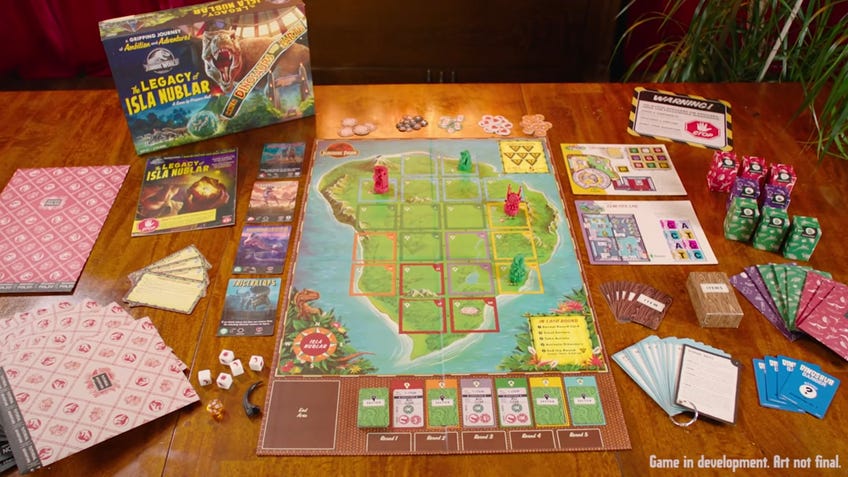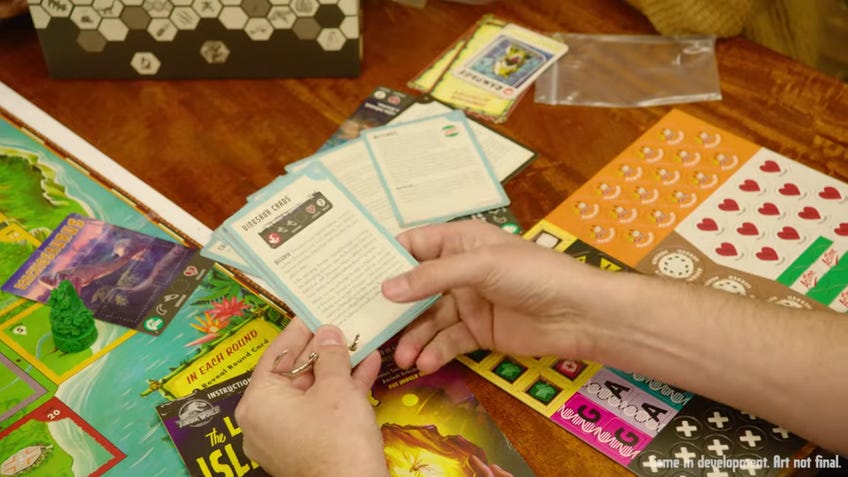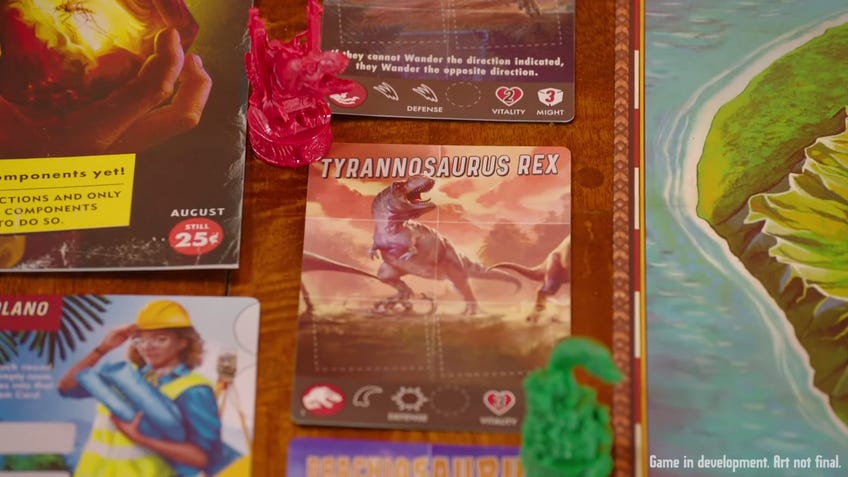Disney Villainous, Horrified and Jaws studio Prospero Hall talks legacy games and creative freedom at Funko
“The Jurassic World board game is a really great representation of how far we can chase our dreams.”
Prospero Hall occupies an interesting position within the board game space. The studio that was once known as Forrest-Pruzan Creative boasted a portfolio of casual family titles alongside a few breakout hits, such as Harry Potter: Hogwarts Battle. They were acquired by the biggest name in fandom paraphernalia, Funko, in 2019 and have been steadily creating licensed tabletop adaptations of pop culture under the nom de plume Prospero Hall, though many others - Horrified, Jaws and Disney Villainous - are published by other companies such as Ravensburger.
The studio’s latest project, Jurassic World: The Legacy of Isla Nublar, is a huge step forward both in terms of physical scale and design ambition. As detailed in a recent preview of the upcoming board game, players will build the eponymous park through a series of 12 session-length adventures that cover the events of the book and film franchise. Facilities, defences and genetic modifications to dinosaurs are all permanent fixtures unique to that copy, and the consequences of failure always carry forward.
Isla Nublar is also a continuation of Prospero Hall’s desire to rehabilitate the popular perception of licensed board games from low-effort dreck to genuine celebrations of beloved films, as vice president Deirdre Cross and editorial manager Ruby Wishnietsky explained during a recent interview with Dicebreaker. They also discussed the challenges of creating the tabletop version of Isla Nublar and what their relationship with Funko means for the studio’s future.
How did you secure the chance to work on a Jurassic Park board game? Did they come to you?
Deirdre Cross: When we wanted to start talking about this, we went straight to our friends over at Universal and said, “Hey, do you guys know what a legacy game is? We want to take the entire Jurassic World franchise and make it into this epic play experience.” And they were like, “Wow, that sounds awesome. Let's go.” I mean, they were just all in right from the start.
There's kind of a stigma, perhaps, or something against a licensed game. I think that's changed a lot in the last five years, and I do think we've been a big part of that conversation.
Do you feel like your work on past projects gave you the leeway to pitch an idea this ambitious?
DC: I think so. It did require that sort of trust from the licensor and that really strong relationship that we have for back-and-forth communication with them. So, we had talked for many years about doing a legacy game, and wouldn't it be fun? Then it was like, “We should really talk to Universal because this is such a fantastic brand. It's so epic in scale already.
What made the team so sure that it was time for a new legacy game?
RW: I think a big part of that is our studio is filled with board gamers who are really tapped into all kinds of games, what new games are out and interesting ideas. At that point, a lot of us had been playing legacy games, and we were like, “We want to do this. We want to tell a big, expansive story, have this exciting sandbox, experience those epic, permanent changes.” And with the Jurassic World franchise, it was such a perfect marriage of that gaming format with the themes of these stories - you can't put these dinosaurs back in their cages, at a certain point. So, it was very much like, we want to make a big game like this, and this is the big licence for it.

Legacy games might be broadly enjoyed, but they’re also a big ask in price and time investment. Were you worried that you were cutting your legs out from underneath how successful the game could be?
We do unlicensed games, and I think they're great and fun, but honestly, I really enjoy that aspect. I like being the licensed game company. I love the storytelling aspect.
RW: We definitely knew all of the sort of cons that people talk about legacy gaming, all of the things that people had said, like, is it replayable? What's going into the box? All of those aspects. But we were really passionate about this project, because we wanted to make this game. We wanted it to exist. If there are as many of us in the studio making the game who want to get our hands on it, we know other people will, too. That’s how we came to the way we would bring this game to the people, which is launching on Kickstarter.
You bring up Kickstarter, which is a bit of an elephant in every room these days. Were there any concerns within the team that this is, you may want to look at a different crowd funding direction in light of the recent blockchain technology news?
DC: Like everyone else, we heard about Kickstarter’s blockchain plans when everybody else did. There was a lot that was already established, including the announcement of our product and where it would be and all of that. So we felt like it was appropriate to stay the course with our plan. But like everyone else, we're interested to hear more about what's going on with that and what they're going to be doing there.
Are you looking at Gamefound, Indiegogo or other platforms for potential future projects?
DC: Yeah, we're investigating all of those. And I would say any of those options are on the table for future projects we might do.
Do you see crowdfunding as a big part of Prospero Hall’s future in board games? You folks are owned by Funko, which is a large and very profitable company. Do you ever think that there's a point where crowdfunding is something you can do without?
DC: With this particular project, crowdfunding was compelling to us because it's a great way to have this very direct conversation with the consumer in a way that we don't currently, as a game publishing entity, have the reach for, yet. Our company, Funko Games, is only about– three years ago, at the New York Toy Fair, it was announced that Funko Games was going to be a thing. So, we are very young, and our reach is still pretty small, especially relative to all this. Right now, [crowdfunding] is a great way for us to reach out to like-minded folks to which this is one of the largest games our team has ever put out into the market. I would love to see a day where people know our name so well that we can just put a flag up the pole and everybody's like, “Oh, new game!” and they just come right to us. Sure, that would be amazing. But that's probably a ways down the road.
Speaking of that, what kind of logistical challenges did the team face in creating The Legacy of Isla Nublar?
RW: This was definitely a brand new undertaking for Funko Games. It's our first legacy game, and there were certainly a lot of trials, tribulations, errors and a lot of growth that went into our team in terms of making it, not least of which because there was a pandemic in the middle of the development. So, lots of people on the team were getting their hands on new aspects, there was a lot of virtual testing and workshopping, and then figuring out how to fabricate it and see it on a table. Afterwards, we were like, “Okay, here's the game. Great. Now, let's remake it” Because it was actually all in front of us, and we need to change things up and see how it's actually gonna work now that we're back together in a physical space.
DC: Typically, when we're developing a Prospero Hall game, there's one game lead and then the other game makers and other folks on the team support them. But in this one, there were very much a lot of people trying to wrap their heads around all the different parts of it at the same time in this sort of hive mind. It was a real swarm approach where instead of people having just one lead, it was much more of a many hands situation sculpting it simultaneously.

Now that you’ve finished one legacy game, is there a desire to do more within Prospero Hall’s design team?
DC: I would say all options are on the table. We're excited to see how fans of tabletop gaming, legacy gaming and Jurassic World all come out for this. And I think that's gonna tell us a lot about where we go from here. We had an amazing time making this, and it became something that was what we had envisioned, something that we all wanted him to play. Everyone who worked on it can't wait to take it and play it with their playgroups.
It's our first legacy game, and there were certainly a lot of trials, tribulations, errors and a lot of growth that went into our team in terms of making it
Ruby, you’ve been with Prospero Hall since it was Forrest-Pruzan Creative and through the acquisition by Funko. How is the relationship with your parent company? How much freedom do you and the studio feel you have to chase dreams, push envelopes, etc?
RW: I think this project is a really great representation of how far we can chase our dreams. I really don't think this would have been made before we were acquired by Funko. I just don't think it would have been possible. Yeah.
DC: Funko is just like, “You guys already do this so beautifully. We don't want to mess with you. You stay in Seattle, and make your magic. We'll handle the backside of this.”
Another surprising aspect of your relationship is how little the signature Funko Pops make it into the games Prospero Hall creates, Funkoverse aside. Is that something you negotiated from the jump? Have you felt pressured to include them more?
DC: We're not pressured to do it. We have done 23 Funkoverse titles, and you can see them all over the store. We also have a line called Something Wild, which is a card game for like eight bucks, and we're happy to do those things. They're great products, and people really enjoy them. There's no negotiation, or quota or anything. If that might be a thought, there's nothing like that.
Do you worry about being pigeonholed as the licensed game studio?
RW: I definitely don't have any concern with that. I mean, we do unlicensed games, and I think they're great and fun, but honestly, I really enjoy that aspect. I like being the licensed game company. I love the storytelling aspect. As Deirdre talked about, our team are big fans of these pop culture tales. The reason I got into this company at all was that I was searching for a job related to Disney because I'm a huge Disney fan. I've worked on many games as a producer, where I got to tell the stories that I really love and care about. That excites me, so I don't have any qualms with that. I don't think anyone at our team is ever going to worry about that being a ball-and-chain. This marriage is like a lifelong love.
Where do you want Prospero Hall to be in five years? What’s the roadmap?
DC: I think we want to continue pushing the envelope for what's possible for licensed IP-based games. If we look backwards over the last five years, there's kind of a stigma, perhaps, or something against a licensed game. I think that's changed a lot in the last five years, and I do think we've been a big part of that conversation. As we look at the rest of the marketplace continuing to also bring great licensed games, I think we raised the bar and they raised the bar, too. So we're going to continue pushing that and going as big as we can in the next five years to come, and just expand in all directions.
Last question: favourite dinosaur?
DC: Oh, Dilophosaurus.
RW: Stegosaurus, yeah. I did learn some new information about them while working on this game, including the word “thagomizer”.




